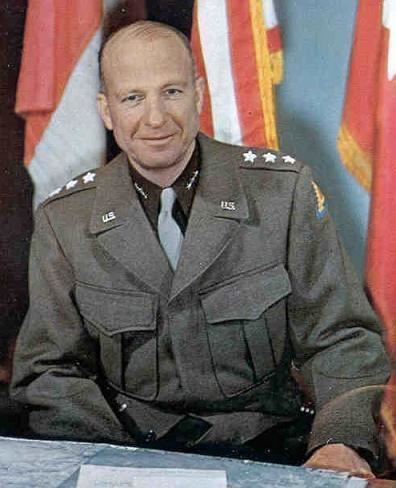The Evening Star (November 22, 1945)
Gen. Patch, 7th Army leader, dies of pneumonia in Texas
Served on Guadalcanal before triumphs in France and Germany

SAN ANTONIO, Texas (AP) – Lt. Gen. Alexander McCarrell Patch Jr., 55, veteran of two wars who led the victorious drive of the Seventh Army across France and Germany, lost his battle for life last night.
The slightly built six-footer, “Sandy Patch” to his friends and his men, who triumphed in the Pacific theater as well as on the European continent, died of pneumonia in Brooke General Hospital here. He had entered the hospital November 14.
Commander of the Fourth Army at Fort Sam Houston since last July, Gen. Patch would have observed his 56th birthday tomorrow.
At his bedside, where an oxygen tent had been used to combat what hospital authorities called a special type of pneumonia, were his wife, Mrs. Julia Littell Patch; his daughter, Mrs. Charles M. Drummond; his widowed daughter-in-law, Mrs. Alexander M. Patch III, and his brother, Maj. Gen. Joseph Patch. The general’s son, a captain, member of the 79th Division in France, was killed October 22, 1944, while assaulting enemy positions.
Pierced Vosges frontier
The colorful career of “Sandy” Patch found a climax in the European war. Placed in command of the Seventh Army March 1, 1944, he trained the army for amphibious operations and led it when it hit the beaches of Southern France August 15, 1944. In three months the Seventh Army drove the Germans back nearly 600 miles. The smashing drive made Gen. Patch the first Army commander to pierce success fully the natural frontier formed by the Vosges Mountains.
Gen. Patch handled the final mopping up of the Japanese on Guadalcanal, moving in with Army troops late in 1942 to relieve the Marines. Previously he had commanded U.S. troops in New Caledonia. For his work at Guadalcanal, he was awarded the Navy’s Distinguished Service Medal.
He returned to the United States in March to head the Fourth Army Corps with headquarters at Fort Lewis, Washington.
Gen. Patch was an Army man from an Army family. The son of an officer, he was born November 23, 1889, at Fort Huachuca, Arizona, and was appointed to the Military Academy from Pennsylvania in 1909. In the World War, he participated in the Aisne-Argonne offensives.
Gen. Patch held the Army Distinguished Service Medal with two Oak Leaf Clusters, the Croix de Guerre with Palm, the French Legion of Honor, Order of Commander and the Ecuadorean Abdon Calderon Star, First Class.
Funeral services will be held at West Point, New York, probably Saturday, and burial will be in the National Cemetery there.
Presented DSM by Navy
It was typical of Gen. “Sandy” Patch that he won the Navy’s Distinguished Service Medal for his conquest of Guadalcanal when integration of the Army and Navy, and cooperation among its personnel, was not yet full-fledged.
It was typical, too, that members of his staff in France seldom saw him wearing his numerous ribbons and that he never stopped a soldier at the front to compel him to button pockets, for his own seldom were.
Gen. Patch took command of the Seventh Army just after Gen. George S. Patton Jr. was relieved from it. At that time there was uncertainty that the landings in Southern France, then in the planning stage, would be successful. The British were opposed to the diversion of American troops from Italy and the French wanted command of any forces landing on the Riviera.
Gen. Patch held all forces together during the tug-of-war for eight months of planning, during which the operation was on the verge of being called off several times. When his three American divisions hit the beach on August 15, 1944, so perfect had the planning been that only about 300 casualties were suffered during the first 52 hours of fighting. The Germans were completely surprised and routed. Taking a chance, he pushed his single corps through the breach up from the beaches.
It had originally been contemplated that the Seventh Army would merely serve to hold down German forces in Southern Prance to divert them from the Normandy front.
Gen. Patch was known as the “quietest tough hombre” in the Army, yet a few staff members saw tears stream down his immobile face once. That was when his only son, “Sandy Jr.,” a West Point graduate and a captain commanding an infantry company in the 79th Division, was killed in the Vosges campaign.
His son was buried in a sheltered valley among the other G.I.’s. There was no special ceremony. Gen. Patch saluted the grave and walked back to prepare the breakthrough which took the Seventh Army to Strasbourg and the banks of the Rhine in a lightning thrust.